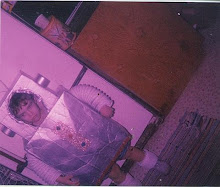I've been thinking about that short story “The Gift of the Magi”—anyone remember it? It's one of those they always make you read in school, along with “The Most Dangerous Game” and “The Lottery”. It's an O. Henry (the author not the candy bar)story, which means that it has a crazy twist at the end. Or at least that was supposed to be his trademark. I've never read anything else the guy ever wrote, as far as I know, but in your English textbook, if you check the author bio before the story, they will not fail to mention how famous he was for his surprise twist endings, making O. Henry sort of the M. Night Shyamalan of his day, I guess.
(Keep in mind that I have not read this story since I was probably thirteen years old, so I may have some of the details slightly wrong, but don't worry, I remember the main plot points.)
ANYWAY, “The Gift of the Magi.” It's a story about Jim and Della, a young couple who are staring down the barrel of their first Christmas together, and they are broke. This is causing some problems for the two of them, because neither can afford to get the other a Christmas gift. Della, the girl, has long beautiful hair, and she loves her husband Jim very much, and she wants to do something really nice for him. So she goes and she has her long beautiful hair cut off, and then she sells it so someone can make a really cool wig out of it. Heartbreaking! She then takes her hair-money and uses it to buy a really nice watch-chain for Jim. This is awesome, the power of love at work, etc. And she goes home and she puts the chain in a fancy box and waits for Jim to get home from working at Mr. Scrooge's counting house or wherever it is a dude worked back then in those days.
So then Jim comes home and before she can give him the fancy watch-chain, he tells her that he has a gift for her, and hands over a box of his own. And so they sit down opposite one another and open up the presents. Bored to tears yet? Well, don't worry, because this is where it gets good. You see, while Della has gone and sold her hair to buy Jim a watch-chain, Jim has sold his pocketwatch to buy Della a beautiful set of silver combs and brushes! The irony is just too much, and they realize that—I don't know, love is good, and it's the thought that counts and all that stuff. It is a beautiful and well-crafted story that is beloved by young and old all the world over.
But here's the thing.
Della's hair—her long, beautiful hair—that shit is going to grow back, and she will be able to use her fine silver combs and brushes and whatnot. But Jim? Jim is shit out of luck—he's not going to be growing a new pocketwatch anytime soon. He totally gets the shaft in this story. A better ending would be, instead of the two of them gently laughing and being grateful to be young and in love and so on, if Jim said “Well, Della, tell you what—in three months when your hair grows back, we'll go sell your combs and stuff and buy me another watch. That way the two of us will be back at square one, you with hair that you can't comb and me with a watch I can't swing around on a chain. Otherwise, this is some god-damn bullshit.”
You know. Something like that.
Moving over to Substack
1 year ago
